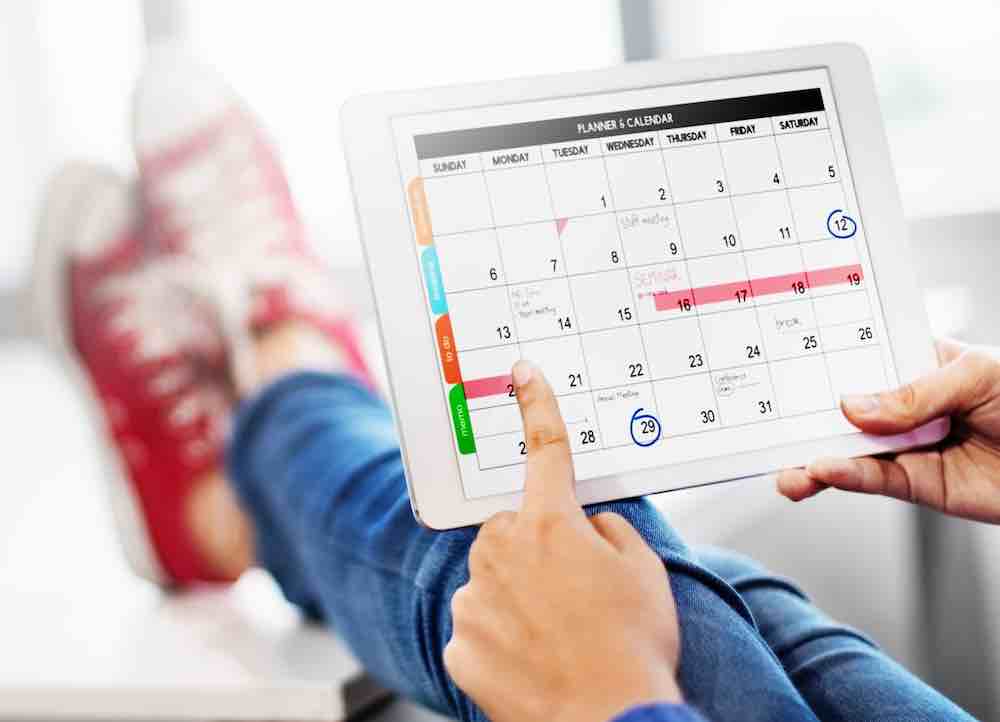If you’re a woman, you might have heard of tracking your cycle at some point. Did you know it’s actually an empowering form of self-care? A lot of us ladies keep track of our cycles. And we all have our own reasons for it. But for most of us, it’s all about understanding our bodies and being in sync with what’s happening each month.
If you’re looking for info on the 28-day cycle when can I test for pregnancy, we’ve got the lowdown for you. ThriVe is a center for women’s health. What’s that mean? We’re like your BFF when it comes to reproductive health, sex, abortion info, and pregnancy. Our blog is a hotspot for medically-accurate info. And that’s important if you think you could be pregnant and need to take a pregnancy test (like a urine test). And our team (of women supporting women) is compassionate, kind, and understanding. Got a minute to chat about tracking your cycle? We’ll share what we know so you can start feeling more in control of your health. You deserve it!

The Basics of Cycle Tracking
Did you know?
The “average” menstrual cycle is 28 days.1 But let’s be real — many of our cycles don’t follow the textbook.2 Our bodies are unique.
Maya Angelou said, “Everything in the universe has a rhythm, everything dances.” This is totally true, even our cycles! Isn’t that cool? There’s a purpose and beauty to each part of your cycle.
When you’re Googling stuff like, “28-day cycle when can I test for pregnancy,” you’ll come across terms like:
– Ovulation: Ovulation usually happens around day 14 if you’re on a 28-day cycle. If you really want to know the exact day you ovulate, you can take your basal body temperature. This is a special thermometer that measures your temperature very specifically. You measure first thing in the morning, before you get out of bed. There are even hi-tech rings you can buy with thermometers built in, so you don’t have to do anything. Ovulation means your body is gearing up for a potential pregnancy.
Your body also shows that you’re ovulating. Some signs to look out for are slippery, thin cervical mucus (white discharge that comes out of the vagina), a slight increase in your temperature, and increased sexual interest. All of these signs exist to prepare your body for a potential pregnancy. Ovulation, periods, and your whole cycle is in place for the purpose of preparing for pregnancy. Therefore, learning all about your specific body is super empowering. When you know your signs and your cycle, you can take charge of your future and your health.1
– Cycle length: These can vary — some of us have shorter cycles, others longer. You know your cycle length by measuring how many days there are between the beginning of your period.1 Mark the first day of your period on your calendar. Then, the next month, mark it again. Count how many days are between them. That’s how long your cycle is!
– Irregular cycles?: No worries, we’ll cover that too! Irregular cycles can be caused by certain factors in your life, including stress, diet, and heavy exercise.3 Some women have irregular cycles pretty often. You can find out if you’re regular by jotting down when your period starts each month. For the next few months, jot down your period’s start date.
Do you regularly miss your period? Are there a seemingly random amount of days between periods? Do you get multiple, or very long periods per month? You could be irregular. Talking to your OBGYN can help you find out what’s going on.
Why is this important?
Understanding your body helps you predict your period, which is key to figuring out when it’s late. And knowing when your period is late is huge, especially if you think you could be in early pregnancy. It never hurts to take a pregnancy test.
When Should You Take a Pregnancy Test?
So, your period’s late. Now what?
If you’ve been tracking your cycle, this is your cue to consider taking a pregnancy test. But the timing can vary depending on a few factors:
– Regular Cycle: If your period is like clockwork, and you’ve been sexually active, take a pregnancy test as soon as you miss your period. We offer no-cost pregnancy tests that are lab-quality. Whether it’s a positive result or a negative, the test may give you some direction.
– Unpredictable Cycle: If your cycle is irregular, wait a few days after your expected period before testing. You’re totally welcome to come to ThriVe for a no-cost pregnancy test.
– Not Sure When You Ovulated?: It might be smart to wait a little longer to ensure accurate results. It’s a good idea to wait until you know you’ve missed your period. Why? The body starts making pregnancy hormone, hCG, after the fertilized egg implants in the uterus. The levels of hCG start doubling every two to three days during early pregnancy. A pregnancy test can usually pick up these levels after a missed period.4 So if you take a urine test too early, you could potentially get a false negative.
What If Ovulation Happens Later?
Quick Question:
Have you ever noticed your period arriving later than expected, even though you were tracking?
Here’s the deal:
Ovulation doesn’t always stick to day 14.1 Factors like stress and heavy exercise can delay ovulation, which means your period will be later too.5 So if you think you might be pregnant (and you’re not sure about your ovulation date), waiting a bit longer to take a pregnancy test can give you more accurate results.
Remember:
It’s normal for your body to change things up every now and then. The key is to be attentive and listen to what your body is telling you. If you’ve been sexually active and you’re stressed that you could be pregnant, please come see us. It doesn’t take long to take a pregnancy test. If you’re looking up “28-day cycle when can I test for pregnancy,” we’ll help get you answers. Our no-cost pregnancy tests are lab-quality and we’ll be right there with you.
Tracking Your Cycle: A Key Part of Self-Care
Let’s talk self-care.
Taking care of your body isn’t just about face masks and bubble baths (though those are great too). Tracking your menstrual cycle is a powerful form of self-care. Why?
– You’re in tune with your body. Understanding your cycle means you know what’s normal for you — and what’s not.
– You can spot changes early. Whether it’s an irregular period or unexpected symptoms, tracking helps you catch issues before they become bigger problems. You can find out about a potential pregnancy sooner if you know what’s going on in your body.
– It empowers you to make informed decisions. Knowing when to test for pregnancy, when to see a doctor, or even just when to expect your period helps you stay in control. At ThriVe, we care about you making authentic choices for yourself. That’s why our women’s advocates are here. We’ll be available to answer your questions, while educating you on all the pregnancy choices.
What Happens After the Test?
Got questions about what to do after taking a pregnancy test? Well, first of all, you’re not alone. We know that an unexpected pregnancy can be confusing and scary. We’ve been there. Our team is here to support you with medically-accurate information, whatever it is you decide to do. But for now, here are some questions you might have:
Q: What should I do after I take my home pregnancy test?
A: Whether your urine pregnancy test is positive or negative, it’s important to follow up with a healthcare provider. If your pregnancy test is positive, they can confirm the pregnancy and discuss next steps. If it’s negative but your period doesn’t start, consider retesting in a few days or talking to a healthcare professional to rule out any issues. We’ll be able to take care of you at ThriVe with no-cost pregnancy tests and ultrasounds.
Q: Where can I get a no-cost pregnancy test?
A: ThriVe offers no-cost, lab-quality pregnancy tests that are accurate and confidential. Plus, our team is here to support you, whether you’re looking for information or just need someone to talk to.
Q: What if my cycle is irregular, and I’m not sure when to test?
A: If your cycle is unpredictable, it might be best to wait a few extra days after your missed period before taking a test. And if you’re unsure, ThriVe can help guide you through the process. We’re here to talk, even if you just have questions about your cycle or potential pregnancy. You should never have to go through this alone.

Why Confirmation Matters
Let’s be real:
Waiting can be tough. But getting a confirmed result about your potential pregnancy is so important. It’s part of taking care of your health. That’s where ThriVe comes in with:
– No-cost, lab-quality pregnancy tests you can trust. If your pregnancy test is positive, an ultrasound can confirm if the pregnancy is viable, progressing as it should, or not.
– Supportive staff and medical professionals to talk things through, especially if your cycle is irregular or you’re feeling unsure.
– Peace of mind knowing you’ve got medically-accurate information.
Don’t stress—just track, test when it’s time, and know that we’re here for you every step of the way.
Got more questions? Reach out to us at ThriVe. We’ll help get you the answers you need. Our center is a judgment-free zone. A safe space. After all, you deserve the best care and attention.
Sources:
1https://www.mayoclinic.org/healthy-lifestyle/getting-pregnant/expert-answers/ovulation-signs/faq-20058000
2https://www.mayoclinic.org/healthy-lifestyle/womens-health/in-depth/menstrual-cycle/art-20047186
3 https://newsnetwork.mayoclinic.org/discussion/many-possible-causes-of-irregular-periods/
5 https://www.mayoclinic.org/diseases-conditions/amenorrhea/symptoms-causes/syc-20369299




